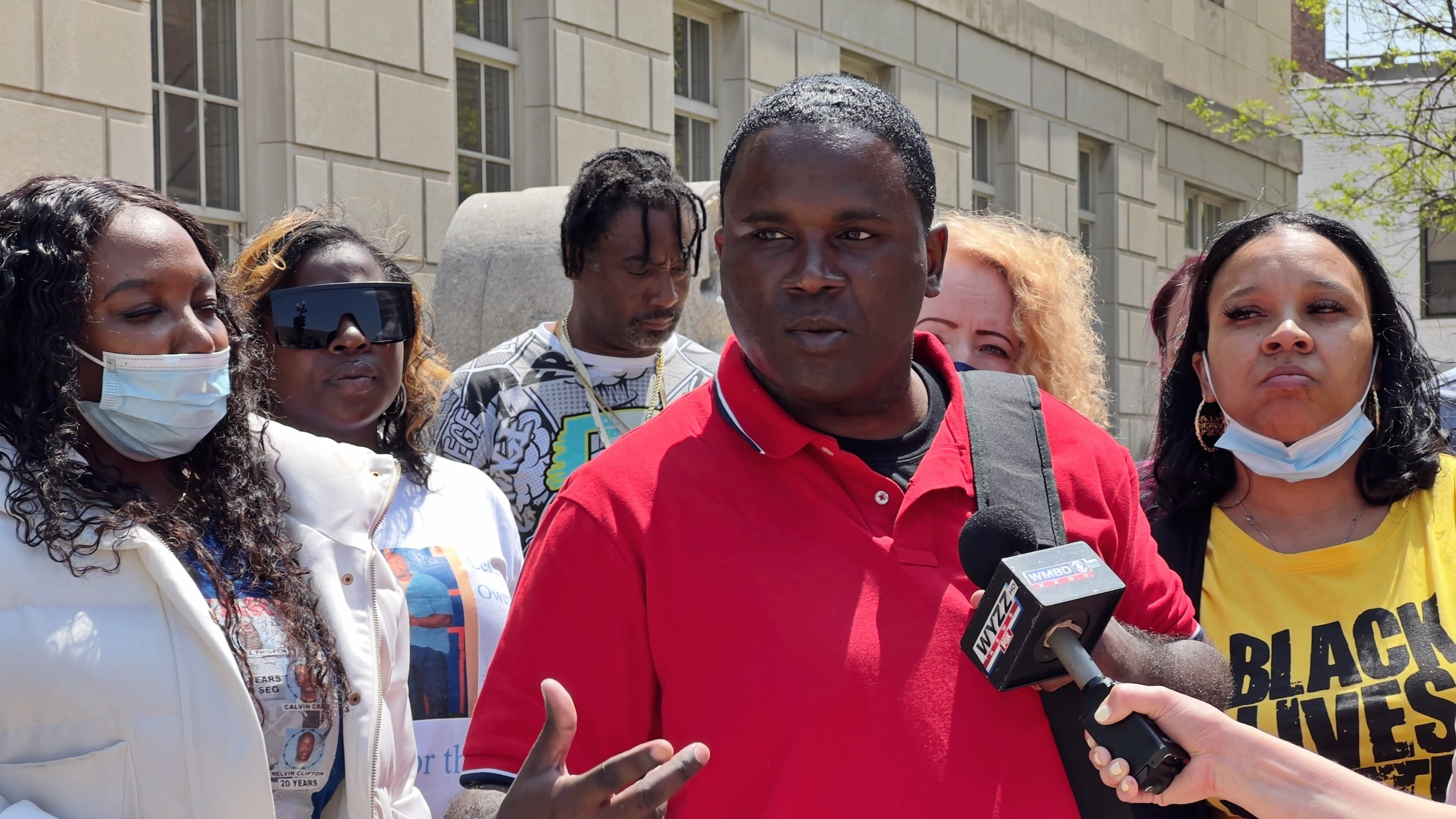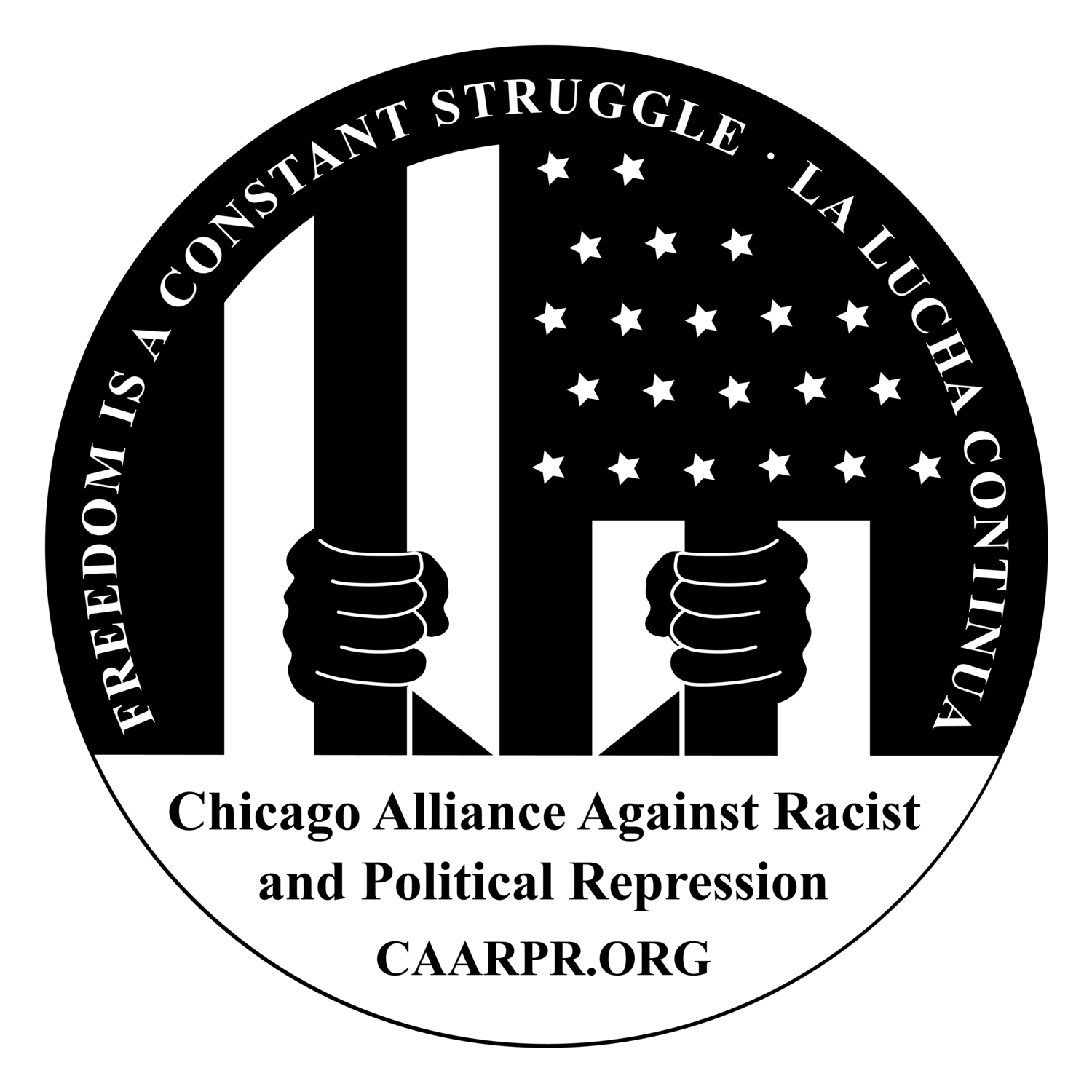
FREE ANTHONY GAY!
Anthony Gay outside Peoria Federal Court House with supporters in May of 2022.
ANTHONY’S STORY
Anthony Gay is a political prisoner. He was incarcerated at 21 years old for a minor offense and held in solitary confinement for 22 years in Illinois prisons. Much of that time was spent in Tamms Correctional Center, a torture chamber designed for solitary confinement and sensory deprivation that was closed down in 2013 after years of pressure.
Gay fought to get himself free in 2018 alongside his lawyer, Jennifer Soble from the Illinois Prison Project. After his release, he became an advocate against solitary confinement and fought to pass the Isolated Confinement Restriction Act to limit the use of solitary confinement to ten days in a 180-day period, bringing the law in line with the United Nations definition of torture. The bill passed the Illinois House but is stalled in the Senate. During this legislative battle in 2020 Gay was arrested in a frame-up by the Rock Island Police Department for possession of a firearm and ammunition, which he was barred from because of a felony on his record. He represented himself in federal court and achieved a hung jury. At his second trial, he was convicted by an all-white jury.
Since this conviction in the spring of 2022, Gay was transferred to Federal Correctional Complex (FCC) – Butner, North Carolina, where he was meant to undergo psychological evaluation. The forensic psychologist evaluating Anthony, Dr. Heather Ross, was the sole witness called by the prosecution in the sentencing hearing. Ross opened her remarks explaining that she was not an MD, and that her role was to evaluate and not to treat Gay. Ross then claimed in her testimony that Anthony did not have PTSD, that his borderline personality disorder could not be considered a serious mental illness, that he engaged in self-harm in order to manipulate people and his conditions, and that he refused to take medication. She explained her treatment plan for Anthony, which involved denying him social interaction after he had engaged in self-harm.
Anthony’s defense lawyer, Jennifer Soble, later noted that in his five months at FCC-Butner, Gay spent 90 days on suicide watch, engaged in self-harm 20 times, and underwent 12 surgeries. Soble explained that despite Anthony informing staff at FCC-Butner that isolation would exacerbate his mental health symptoms, he never left suicide watch or lived with others.
At one point, Gay was transferred to the medical side of the complex, FMC-Butner, where his treatment plan included being denied soap and boxers when he exhibited symptoms of his mental illness, and where he continued to be placed on suicide watch. Suicide watch in federal prisons involved being placed in an empty cell with a mattress and a smock and watched by an “inmate companion.” An “inmate companion” is another incarcerated person with four hours of training.
Government psychologist complicit in torture
After Ross left the stand, the defense called Dr. Terry Allen Kupers, a psychiatrist and forensic psychiatrist who has been studying the effects of solitary confinement for many years.
Dr. Kupers stated clearly that he recognized suicide watch as a form of solitary confinement. He also confirmed that Anthony does have PTSD, which the defense pointed out every doctor who has examined Anthony has determined besides Dr. Ross. And he clarified that borderline personality disorder is categorized as a Serious Mental Illness under the official definition when its effects are disabling and prolonged. He described his visit to Tamms during Gay’s time there, where the floors of the cells were built slanted to make it easier to wash out blood and other bodily fluids.
Kupers recounted his interviews with those who had been held in prolonged solitary confinement and explained that 50% of suicides in prison occur in solitary confinement, and self-harm is common.
He testified that the treatment Anthony received at FCC and FMC Butner was in violation of the American Psychological Association’s standards for correctional mental health care and the United Nations’ Mandela Rules, which state that more than 15 days in solitary confinement is considered torture, and that those with serious mental illness should not be held in solitary confinement.
Dr. Kupers also explained that Anthony’s self-harm is largely motivated by a need for relief from psychological pain, and that subjecting Anthony to solitary confinement is what is causing his psychological pain, making it impossible for Anthony to receive effective treatment while held in isolation.
On the second day of the hearing, the prosecution claimed that Gay’s mental illness should be taken as an “aggravating factor” in the sentencing, meaning a reason to lengthen his sentence. They claimed that Gay is a danger to the community based on his history of criminal charges. The defense pointed out that the majority of these charges were aggravated battery charges brought against Anthony during his incarceration, when Gay was frequently punished for exhibiting symptoms of his mental illness.
Specifically, attorney Soble explained, a large number of these charges were brought against Anthony while at Pontiac prison in Livingston County, Illinois during a time when Livingston County was bringing so many charges against people incarcerated in Pontiac that it led to a class action lawsuit. In one year, of the 300 prosecutions brought against incarcerated people in the state of Illinois for aggravated battery, Livingston County accounted for 70% of them.
The defense further explained that these sentences were being dealt with consecutively instead of concurrently, leading to a stacking effect where extended sentences were brought against those charged. Soble explained when she met Gay, his seven-year sentence had been stacked to an over 100-year sentence. Challenging this illegal stacking is how Anthony was able to fight to get himself free in 2018. But despite the judge in that case agreeing to make Anthony’s sentence concurrent, those charges are still included in the calculation of Gay’s criminal history, which was the basis of the prosecution’s arguments. According to the calculations, Gay could be sentenced to anywhere from 84 to 105 months. The prosecution asked the judge for 105 months or more.
Soble reminded the judge of torture Anthony has undergone in prison. She cited experts in solitary confinement, official policies on the treatment of the mentally ill, doctors who had treated Gay previously, none of whom shared Dr. Ross’s conclusions. She gave a powerful example of the failures of the “treatment” provided Anthony while on suicide watch. She cited records of an incident where Anthony’s “inmate companion” asked for psychological and medical assistance multiple times throughout the day and no one came, despite Gay’s serious injuries.
Ultimately, Soble asked the judge to sentence Anthony to 12 months, which he had already served plus probation. She made the argument that the federal Bureau of Prisons is not fit to house or treat Gay, based on their track record of subjecting him to isolation. She pointed out the role Gay was able to play in his community while on supervised release, and the support he has on the outside. She argued that Gay’s mental illness should be taken as a mitigating and not an aggravating factor, and that using his illness to justify a lengthier sentence may be a violation of the Americans with Disabilities act.
Sentence shows judge’s cruelty
After a brief recess, Judge James Shadid returned to the bench, and opened his remarks saying that Anthony’s mental illness is “both an aggravating and a mitigating factor,” but that he agrees with the prosecution that Gay is a danger to his community. He stated that admitting Anthony cannot be safely incarcerated would give him a blank pass, and said this hearing was “not a popularity contest.” He issued Gay a sentence of 84 months, with three years of supervised release after the fact.
In response to this sentencing, Gay said, “My conviction and sentence is unjust. The fight for justice continues. I will be filing an appeal and request the appellate court reverse and remand my case for a new trial and a fair opportunity to put this case in the litigation dock.”
Frank Chapman of the Chicago Alliance Against Racist and Political Repression stated, “This sentence is a grave injustice, but Anthony is a courageous freedom fighter. The National Alliance will continue to stand united with Anthony every step of the way.”
Please Take These 3 Steps:
1) Please sign the petition here. You can sign as an individual AND as an organization.
2) If you are able, we are seeking letters of support addressed to these two congressmen to attach alongside the petition when we submit it. We will follow up with phone calls and text messages to the people Anthony specifically requested write these letters of support, but we could use as many as we can get. We are asking for these letters of support to be submitted to joeiosbaker@gmail.com by Friday June 9th.
3) Please help us circulate the petition, spread it through your organizations and networks. We've attached a graphic that can be used to circulate it on social media as well.
To learn more about Anthony’s story and his fight to end solitary confinement, please visit: www.dismantlesolitaryconfinement.com/
Statements and Press
Statement by Angela Davis on Wrongful Conviction of Anthony Gay
Fight Back News - How Frame-ups Works: The Anthony Gay Trial
Truthout - Angela Davis Says Black Activist Anthony Gay is Jailed on False Charges
NAARPR Statement - June 20, 2022
The Nation - When Suicide Watch Becomes a Death Sentence
Fight Back News - Judge Sentences Anthony Gay to 7 Years of Torture; Anthony’s Fight Continues


